Tsuriyane - suspended roof. The roof over the dohyo resembles a shinto shrine with tassels in the corners to symbolize the 4 seasons of the year.
Kesho mawashi - ceremonial apron.
Tsuna - the thick white braided hemp rope worn by a yokozuna over his kesho mawashi
Mawashi - a 9 metre (10 yards) long, 60 cm (2 feet) wide silk cloth wrapped around the rikishi's belly and groin in which the rikishi fights his bout. A few slender stiff rods are suspended from the front of the belly, but these are for ornamental purposes only.
Dohyo iri - entering the dohyo ceremony
[ Dohyo Schematic ] - click here for a large overhead schematic drawing of a dohyo. Use your browser's "Back" button to return to this page.
Tsuruharain - the swordbearer accompanying the yokozuna
Tachimochi - the herald or attendant to the yokozuna at his dohyo iri
Shiko - the act of stamping the foot onto the dohyo
On the left is shown the tsuriyane suspended over the dohyo, the ring in which the bout takes place. The dohyo is sacred ground, and no women are allowed onto any dohyo, even the practice dohyos in the wrestlers' stables. The reason is that women menstruate, and their blood will affect the purity of the dohyo.
Bouts take place from the morning on each day of a tournament,
with the junior wrestlers fighting early on. Before the main bouts
of the Makuuchi rikishis, a ceremony called dohyo-iri, or entering the
dohyo takes place. This ceremony has two parts, the first a simple
ceremony of all the rikishis below the rank of yokozuna, and the second,
an elaborate ceremony performed by each yokozuna.
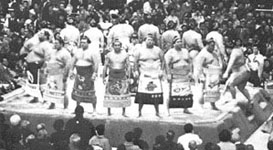
The rikishi's enter en masse by East or West side, each
wearing his kesho mawashi, and perform a simple hand clap, to attract the
attention of the gods.
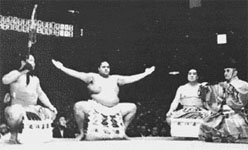
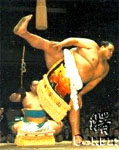
The dohyo-iri of Yokozuna Akebono, formerly Chad Rowan from Hawaii.
Note how high he is able to raise his right leg in the foot stamping ritual,
on the right, and still be well balanced. Akebono stands 2.04 metres
(6 ft 8.5 in) tall, and weighs 222 kgs (490 lbs).
A yokozuna's dohyo-iri is a beautiful ritual to watch,
full of colour, ritual, and meaning. Each yokozuna is dressed in
his kesho mawashi and an elaborate braided hemp tsuna. He is accompanied
by a senior gyoji, and two attendants - the tsuruharain and tachimochi.
After entrance, the yokozuna performs a ritual which consists of a clapping
of hands to attract the attention of the gods, extending his arms outward
with palms up to show that he carries no weapons, and a delicate raising
of his leg and foot high on the side and stamping the foot onto the ground
to drive out evil from the dohyo. This stamping action is usually
accompanied by the audience yelling "Yoh" at the point of the foot hitting
the ground.
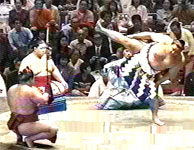 The
dohyo iri of Yokozuna Takanohana. Note the elevation and how straight
his raised right leg is. This is a beautiful motion requiring flexibility
in the leg/thigh muscles and great balance.
The
dohyo iri of Yokozuna Takanohana. Note the elevation and how straight
his raised right leg is. This is a beautiful motion requiring flexibility
in the leg/thigh muscles and great balance.

The ending ceremony of each day's bouts is the yumitori shiki, where a rikishi performs a ritual with a bow and stamping of the feet onto the dohyo. This ritual is an expression of satisfaction on behalf of the winning rikishi's that day.
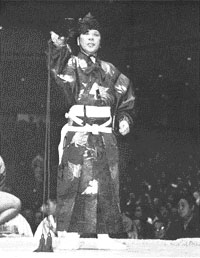
Gyoji - the referee
Gunbai - the referee's fan
Shinpan - a judge, in black robe
The gyoji is the referee who officiates at each bout, in addition to other duties, such as can be see in the pictures on this page - in dohyo iri to accompany the yokozuna, and at the yumitori shiki, the closing ceremony. Gyoji's have their own ranking system, and the tate-gyoji is the highest rank, and only a tate-gyoji can referee a bout with a yokozuna. The gyoji wears a kimono similar to those worn by samurai (warrior) from the Kamakura Period in Japanese history, and a hat which is like a shinto priest's hat. He carries a fan, called a gunbai, the tassels on which are of different colours to reflect the gyoji's rank. The higher the rank, the more elaborate the outfit, including the right to wear split toe socks and straw sandals for the higher ranked gyoji's, whereas the lower ranked gyoji's go barefoot.
Around the dohyo also sit five judges called shinpan,
who are mostly from the ranks of retired rikishi's. In the event
of any question regarding the winner of any bout, the shinpan will gather
in the center of the dohyo and deliberate as to a final decision, including
reversing a gyoji's initial call as to who is the winner, or requiring
a rematch of the bout just concluded.
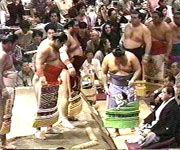 A
shinpan sitting in lower right during dohyo iri of all the rikishi's.
The rikishi's are wearing their kesho mawashi.
A
shinpan sitting in lower right during dohyo iri of all the rikishi's.
The rikishi's are wearing their kesho mawashi.